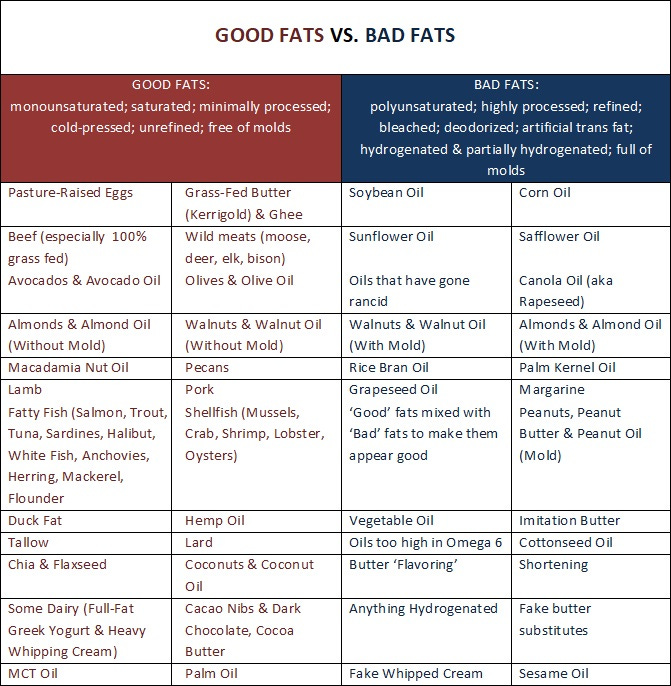We have all been fed the lie that eating fat will make us fat. But the truth is that we need fat—healthy fats that is. And more and more people are discovering the benefits of eating a keto or carnivore diet.
Personally, my diet falls somewhere in between the two, and that is why I call myself a ‘ketovore.’ I consume a lot of fatty meats, fatty fish, pastured eggs, cod liver, and butter, and I hardly eat any veggies at all. Kimchi is an almost daily staple in my diet; I eat it for the benefits it provides for gut health. Other than that, I eat pickles, drink coffee, use various seasonings to flavor my meat, as well as the occasional bacon-wrapped onion rings cooked in the air fryer.
Fat Is Not Your Enemy
As long as it is good fat that is. The chart below will give you better insight into what foods are highly beneficial to consume, and which foods you would do well to avoid.
A few tips:
Fish: choosing wild-caught fish is important. For instance, even if you manage to find farmed salmon that is not penned in tight and swimming in their own feces (bleh!) they are not likely being fed krill, which is what gives us those much-needed omega 3’s! Also, make sure the fatty fish you choose are not high in mercury
Salmon (Wild-caught Sockeye is one of the best)
Mackerel (choose Atlantic; it’s not high in mercury)
Sardines (canned is good)
Herring (canned is good)
Trout (similar in taste to salmon; slightly higher in mercury; lower in price)
Anchovies (canned is fine, and they have anchovies that are not salty)
Tuna (generally a bit higher in mercury; eat sparingly)
Nuts & Seeds: (they must be soaked properly to avoid molds; avoid peanuts and cashews completely, as they are the moldiest nuts on earth
Good Oils:
Coconut oil (organic extra virgin is best)
Olive oil (organic extra virgin is best; do not heat at high temperatures because of low smoke point)
Flaxseed oil (do not cook with it)
Walnut oil (do not cook with it)
Avocado oil (generally pricey, but worth it; makes a great mayo)
MCT oil (bulletproof coffee anyone?)
Bulletproof brand MCT oil, better known as ‘Brain Octane’ is fantastic!
Palm oil (not ‘palm kernel’ oil, which is different from ‘palm’ oil; also, ‘refined palm oil’ is bad; purchase palm oil from manufacturers who care about the environment, and are not destroying ecosystems to produce oil; Grain Brain brand palm oil is one of the best, and rated #1 sustainable palm oil manufacturer in the world)
Macadamia nut oil (I don’t generally recommend nut oils because most have molds, but macadamia nuts are typically nearly mold-free, and so macadamia nut oil should be generally safe to consume)
Grass-fed butter (I recommend Kerrygold)
Ghee (if you have a problem with regular butter)
Fruits & Veggies: Avocados and olives
Beef & Pork: Just eat them!
Poultry: These provide protein, but not enough fat. So if you must eat chicken or turkey, add some butter or avocado mayo, or wrap them in bacon, or something!
Eggs (always go for the pasture-raised; avoid the ones that say ‘natural’ or ‘cage free’; they like to trick you with words)
Dairy: milk is too high in sugar; go for the heavy whipping cream for coffee, cream sauces, etc.; stay away from skim milk! It is a regular practice for farmers to feed baby cows skim milk to FATTEN THEM UP!
Fat from animal fat is better than fat from vegetables. No, animal fat is not responsible for one’s clogged arteries. Bad oils—such as the ones I listed above in the chart—are the real culprit. When we eat foods soaked in these oils—particularly deep fried foods, fast food, processed food—it causes tiny tears in the walls of our arteries, which catches other things floating by, causing a build-up.
For a more comprehensive list of healthy keto/ketovore foods, read ‘My Good and Bad Foods List.’
Stop being afraid of fat; sugar, grains, and bad oils are the true perpetrator. God bless you on your journey to health and wholeness. Don’t just live, but thrive.
~Spring Dalton
Disclaimer: The information in this newsletter does not substitute or replace professional medical advice, diagnosis, or treatment. You should always consult with a physician or health-care professional if you ever have concerns or questions about your health. The use of any information found in this newsletter or any of the content within Ketovore with Spring is solely at your own risk.
Important Links:




